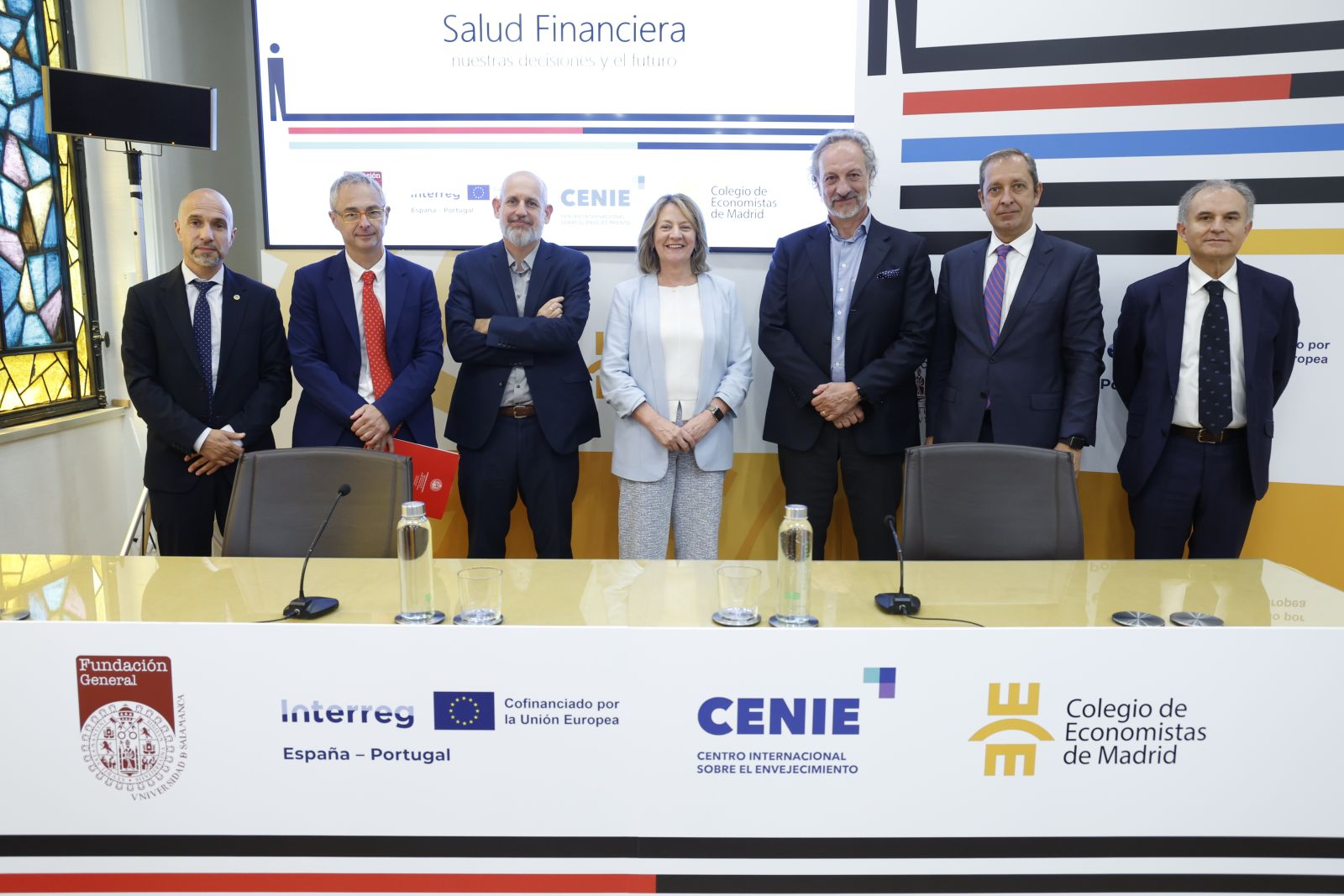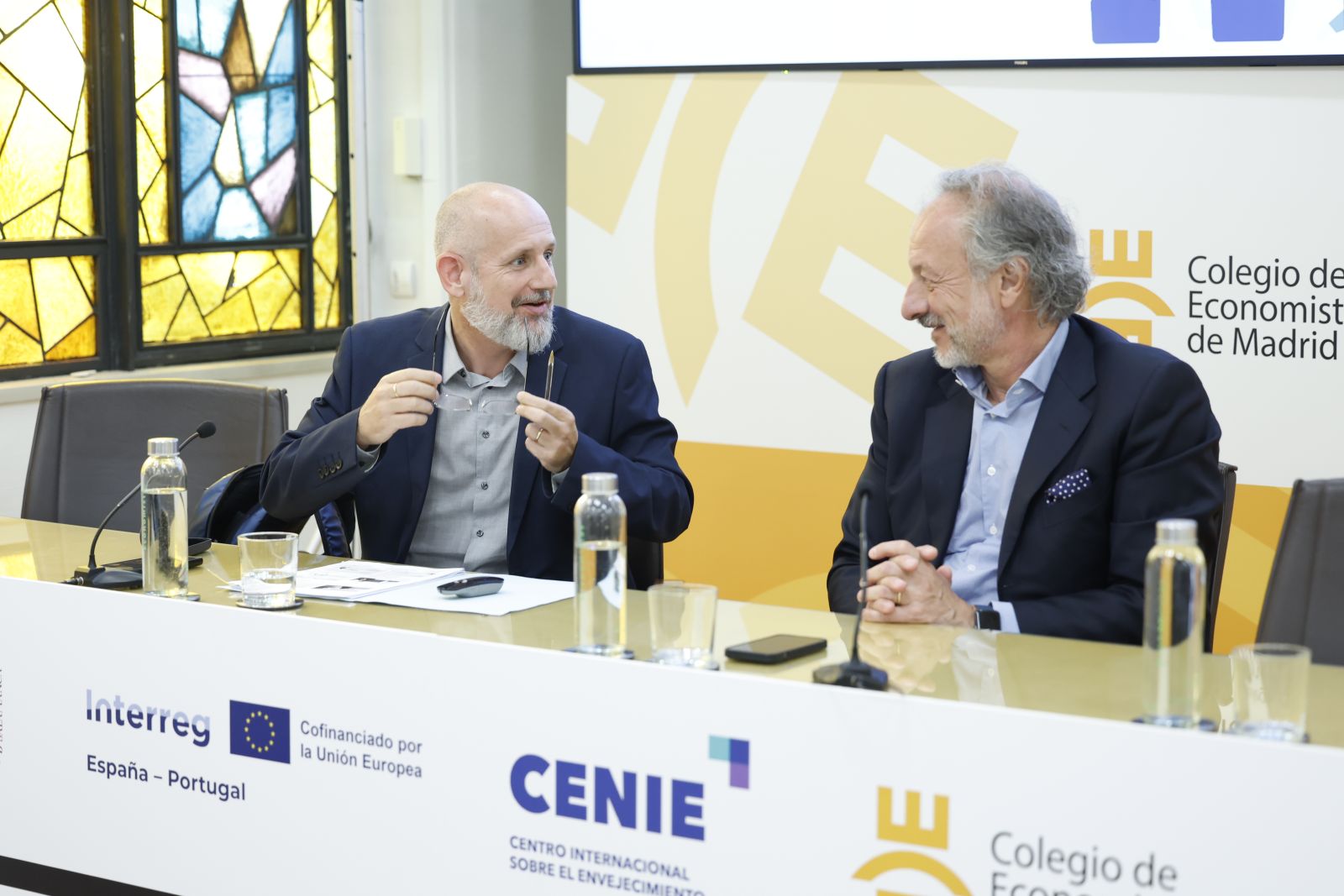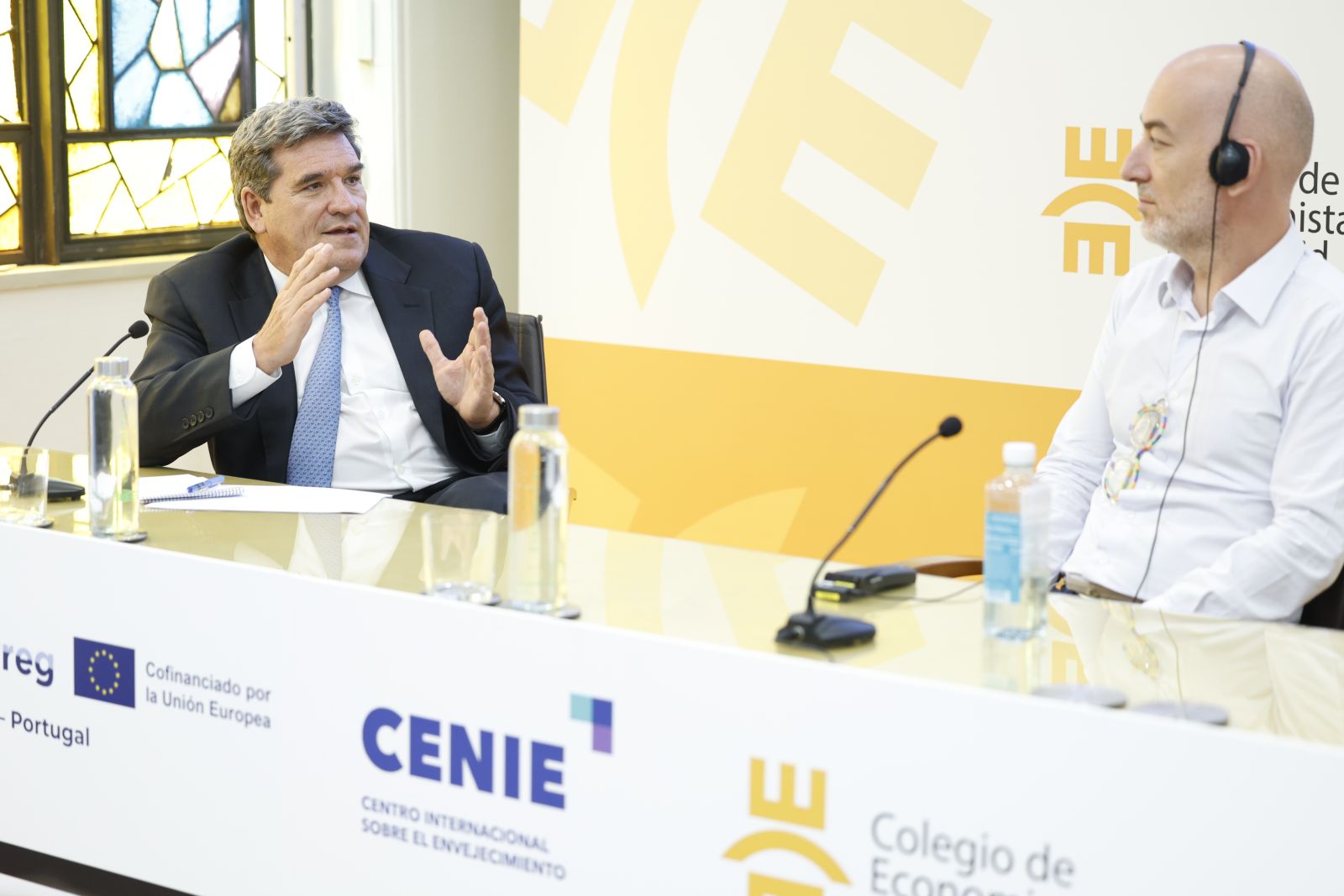Actividades
Financial Health - CENIE presents the research: "financial health: our decisions and the future".

CENIE (International Centre on Ageing), an entity promoted by the General Foundation of the University of Salamanca, has presented the main results of the research report 'Financial Health: Our Decisions and the Future', an initiative that is part of the Programme for a Longevity Society, within the framework of the INTERREG V-A Cooperation Programme, Spain-Portugal, POCTEP, 2014-2020, of the European Regional Development Fund (ERDF).
The research was conducted by Novaster, which provided its expertise in pensions, health and financial education, and behavioural and longevity economics. The presentation of the conclusions of the study took place at the headquarters of the Madrid Association of Economists (CEMAD) and was opened by Amelia Pérez Zabaleta, decanapresidenta of CEMAD, who pointed out that "providing our economy with maximum predictability, achieving solid and sustainable development, involves guaranteeing optimal financial health for our citizens, which provides them with a better quality of life and greater wellbeing".
The Director of the General Foundation of the University of Salamanca, Óscar González Benito, accompanied the Dean-President of CEMAD at the opening ceremony of the event on behalf of CENIE, and has assured that "maintaining good financial health not only implies having economic stability and sufficient resources to cover our basic needs, but also making prudent financial decisions in the long term. A responsible approach to our finances can allow us to save and invest for the future, thus ensuring our financial security as we age, which can give us access to certain care and healthy lifestyle choices, which in turn will positively influence our longevity".
Conclusions presentation
Diego Valero, CENIE researcher and director of the report, and Jaime García, CENIE researcher and coordinator of the report, have been responsible for presenting the main conclusions of the study and the online course 'Financial Health: introduction'. Valero explained that "together with physical health and mental health, we must preserve financial health, which consists of the ability to understand and manage our basic finances, and to be able to make reasoned decisions on issues that affect our wealth and our personal economy".
Meanwhile, Jaime García said, "Improving our future financial health requires greater awareness in terms of setting both short and long-term goals for the future, as well as preparing for emergencies without financial impact. As well as continuing to work on improving and enhancing day-to-day management, financial flexibility and the use of smart debt. For all this, it considers it necessary to provide the population with useful means and manageable tools to improve financial education". This first panel concluded with the presentation of the online course Introduction to financial health, which aims to be a didactic approach to how we perceive our own financial health and how we can improve it.
Open dialogue: How to promote the financial health of Spaniards?
The round table discussion, How to promote the financial health of Spaniards? moderated by Pablo Muñoz, coordinator of the Economics of Longevity Area of CENIE, was attended by Fernando Tejada, Director of the Department of Conduct of Institutions of the Bank of Spain; Francisca Gómez-Jover, Deputy Director General of Organisation, Studies and Complementary Social Welfare of the Ministry of Economic Affairs and Digital Transformation, María Eugenia Cadenas, Coordinator of Financial Education of the CNMV, and Juan Calos Delrieu, Director of Sustainability of the Spanish Banking Association.
During his speech, Fernando Tejada, director of the Bank of Spain's Conduct of Business Department, highlighted "the interest of supervisors, in Spain and in all countries, in financial education, highlighting how this complements regulatory and supervisory action on the conduct of financial institutions by empowering citizens and companies and enabling them to make responsible financial decisions, something that definitely contributes to the financial health of individuals and society".
In this regard, Francisca Gómez-Jover, Deputy Director General of Organisation, Studies and Complementary Social Welfare, highlighted the strategic axes of the institution, which are linked to the issue of financial health. These axes are: the supervention of the adaptation of institutions and their business models to the current economic environment, sustainable finance (ESG and climate change), the digital transformation in the insurance and pension fund sector, and the introduction and use of artificial intelligence in the different processes and for decision making, and, finally, the influence of the previous axes in the contribution of value in the products offered to customers in the insurance and pension fund sector.
In this regard, María Eugenia Cadenas, coordinator of Financial Education at the CNMV, stressed "the close link between financial health and financial education and the importance of this together with regulation and supervision". In this regard, she focused on the commitment made by the Bank of Spain, the CNMV and the Ministry of Economic Affairs and Digital Transformation to promote the Financial Education Plan, the main purpose of which is to improve the financial culture of the Spanish population.
For his part, Juan Calos Delrieu, Sustainability Director of the Spanish Banking Association, explained that "for Spanish banks it is essential to guarantee access and inclusion to banking services, as well as to encourage actions that promote citizens' financial knowledge in order to achieve greater social and individual well-being", adding that "to encourage knowledge to translate into good financial decisions, it is necessary to complement education with other actions linked to non-cognitive knowledge and behaviour to avoid hasty decisions (responsibility, discipline, motivation, etc. ) as outlined in 'Your Finances, Your Future'".
To conclude the round table debate, Pablo Muñoz, coordinator of the Economics of Longevity Area of CENIE, stressed that "young people need financial knowledge mainly to manage their indebtedness, while older people need it to manage their net worth. In any case, households need to be equipped with knowledge and tools to provide them with the relevant information to make each financial decision".
He added: "Financial institutions must also be called upon to make a clear contribution to the improvement of accurate information in a format that makes it understandable for each user profile. There could also be easily accessible electronic resources from agencies and financial market regulators to make the information that citizens need to make their investment or debt decisions more transparent and reliable.
Conversation: Financial health in the present for a better future
José Luis Escrivá, Spain's Minister of Inclusion, Social Security and Migration, and leading economist Shlomo Benartzi, one of the world's leading experts in behavioural economics, shared the stage in an interesting closing conversation on the topic of financial health today and tomorrow.
The Spanish Minister for Inclusion, Social Security and Migration, José Luis Escrivá, stressed that the pension reform undertaken in Spain in recent years "complies with the mandate of parliament, as expressed in the recommendations of the Toledo Pact in 2020, has been agreed with the social partners and is designed to guarantee both the revaluation of pensions in line with price growth and the sustainability of the system, bearing in mind that the coming decades - the 30s and 40s - are the most stressful for the system for demographic reasons".
In terms of long-term savings, the minister highlighted the development of the recent regulations on employment pension plans: "We have passed a law that, through collective bargaining, allows workers and employers to set up these plans, with tax incentives for those who want to save voluntarily with a view to supplementing their retirement".
In this regard, economist Shlomo Benartzi stressed that "appropriate advice, both personal and automated, can help people, especially those with lower incomes, to properly manage their debt, insurance and retirement savings". Experiments conducted by Professor Benartzi in the US show that the increase in income can be 7.5%.
In his opinion, the main "incentives for healthy retirement savings should be in line with the application of behavioural economics principles, detecting the biases we suffer from as people and making saving easy", just as the Nobel Prize winner Richard Thaler and Benartzi himself made his successful Save more tomorrow programme a benchmark for all the most successful pension systems in the world today.
In this respect, Ricardo Rivero Ortega, Rector of the University of Salamanca, together with the Dean-President of the Madrid College of Economists were responsible for the institutional closure of the event. The Rector expressed the need to be aware of biases. In this regard, he stated that "the bias of presentism has to be corrected, but it is the societies that have to know how to do it". He also explained that "the error of the expert is another bias, because no one makes more harmful errors than those who think they know" and he expressed the importance of "remembering past errors".
Financial Health: Our Decisions and the Future
People's well-being is directly related to physical, mental and financial health. That is why the CENIE-led study, commissioned to Novaster, has focused on building the financial capability that leads to good financial health, the main factors of which are financial inclusion and financial literacy. Both, as detailed in the research report, "enable us to develop the financial capability necessary for our daily lives".
The research has had two central lines: to identify the process of building people's financial capability, paying special attention to the most relevant economic decisions that will help to achieve good financial health in retirement, and to determine the behaviours that, using guidelines from behavioural economics, can be improved to achieve greater future financial capability.
A six-element framework, called Financial Health Objectives (FOs), has been used to identify the degree of financial health. These objectives are: day-to-day management, emergencies without financial impact, short and medium-term goals, financial flexibility, forward-looking goals and smart debt.

This first report has set out the starting point of the study, corresponding to the part of information and empirical data collection that allows us to understand how people's financial capacity is built and to set out the most relevant decisions throughout life that will help to achieve sufficient financial capacity in the period of working retirement. In addition, information from previous studies on the subject carried out by CENIE was compiled and highlighted.
The sample of the present research, launched in February last year through the financial personality test, consisted of a total of 1,832 participants in the first phase of the survey, segmented according to four age ranges: 17 to 25 years old (103), 26 to 35 years old (291), 36 to 64 years old (1,191) and 65 years old and over (247). A total of 523 people participated in the second stage, as follows: 17 to 25 years old (42), 26 to 35 years old (80), 36 to 64 years old (294) and 65 years old and over (107).
Conclusions and the six FSOs
The main conclusions of the report include, among others, that there are three financial health objectives (FSOs) that require a greater effort to raise awareness among the population, and these relate to: emergencies without financial impact, short- and medium-term goals, and future goals (longer term). According to the study, these aspects are the least relevant to self-perceived health.
Another noteworthy fact is that the over-65s, from an economic point of view, consider contributions to the public pension system, their main residence and specific financial instruments, such as pension plans, to be more important when it comes to achieving adequate financial solvency. "The higher the age group, the greater the proportion of people who consider contributions to the public pension system to be important and, conversely, the lower the importance they attach to savings," the report explained.
At the same time, a clear risk aversion was observed across the entire population studied and for all age groups, although the "most risk-loving" age group is the 26-35 age group.
For each of the FSOs, the following conclusions were highlighted:
1. Daily management in balancing expenses and income is perceived as relevant by the entire population in achieving good financial health.
2. The groups studied do not consider the criteria of emergencies without financial impact to be indicators of what constitutes good financial health.
3. From the sample analysed, it can be inferred that people do not consider the components linked to short and medium-term goals as important for their financial health.
4. The aspects surveyed in the sample analysed, in terms of financial flexibility, obtain higher relevance values than the two previous ones and reflect greater relevance with age.
5. The evaluation of future goals reaches values that, although they increase with age, are low for all age groups. The perception of this goal, in relation to self-perceived financial health, decreases with age.
6. The relevance of smart debt reaches high values in all age groups, especially in the 36-64 age group, and its influence on self-perceived financial health is uneven, being significant in the 36-64 age group, where it is most relevant.
According to the report, the results obtained show the need to "improve the levels of financial knowledge of the population, as some of these quantitative results are hardly compatible with good financial health".
Decalogue
As part of this study, a series of conclusions have been drawn up aimed at promoting behavioural changes that favour the objective of improving people's financial capacity in retirement. These reflections have been compiled in a document in the form of a Decalogue.
The 10 conclusions reached by the experts are as follows:
1. The choices we make about our finances determine and condition our quality of financial life in the future. Knowing which behaviours can be improved to achieve greater financial capability is of vital importance in order to adapt to longer lives.
2. Daily management is perceived by the entire population as a relevant factor in achieving good financial health and the degree of magnitude it reaches for the entire population is notable and improves with age, being especially relevant in the case of those over 65 years of age.
3. Both financial flexibility and using debt wisely are high in the population and increase with age. Both factors are understood to be clearly linked to good financial health.
4. Raising awareness of emergency preparedness and setting both short- and long-term goals is an important factor in improving our future financial health.
5. 50% of young people see it as feasible to achieve their financial goals within 10 years. This percentage decreases with increasing age.
6. The minimum amount with which people between 17 and 26 would feel financially stable is 250,000 euros. 200,000 for the 26-35 age group and 400,000 euros for the 36-64 age group.
7. For the over 65s, the order of importance for achieving financial solvency is: contributions to the public pension system, the primary residence and financial instruments.
8. As age increases, contributions to the public pension system become more important and savings become less important.
9. The segment of the population that is most willing to bear risk is between 26 and 35 years of age.
10. It is necessary to provide the population with useful and manageable means to improve financial education, as well as concrete tools to facilitate the understanding of financial magnitudes.



